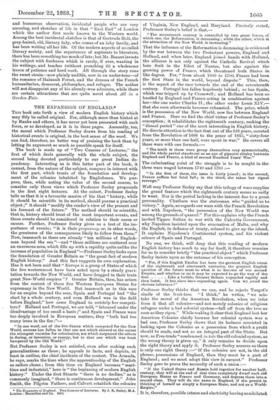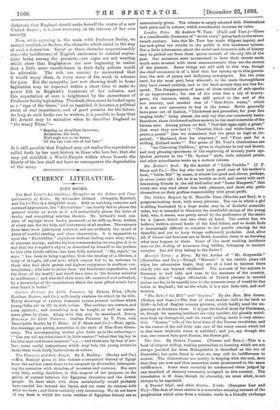THE EXPANSION OF ENGLAND.* Tins book sets forth a view
of modern English history which may fitly be called original. For, although more than hinted at by Ranke and others, it has never yet been presented with such force, or so developed, as it is in these pages. Assuredly, too, the moral which Professor Seeley draws from his reading of historical events is original, in the best sense of the word. We can find, therefore, no better way of praising the book than by letting its argument as much as possible speak for itself.
The book is made up of "Two Courses of Lectures," the first of which deals generally with the whole subject, the second being devoted particularly to our great Indian de- pendency. Interesting as is this latter part of the book, it cannot, from the nature of the subject, compare in interest with
the first part, which treats of the foundation and develop- ment of the colonies inhabited by Englishmen. We pur- pose, then, while noting the value of the second course, to consider only those views which Professor Seeley propounds in the first eight lectures. At the outset, Professor Seeley tells us that it is a favourite maxim of his that "history, while it should be scientific in its method, should pursue a practical object ;" it should "modify the reader's view of the present and his forecast of the future." The method should be scientific, that is, history should treat of the most important events, and these events should be considered in relation to their cause or
causes. Further, Professor Seeley gives us a test of the im- portance of events ; "it is their pregnancy, or, in other words,
the greatness of the consequences likely to follow from them." Now, inasmuch as there are already "ten millions of English- men beyond the sea "—and "those millions are scattered over an enormous area, which fills up with a rapidity quite unlike the increase of population in England "—Professor Seeley looks upon the foundation of Greater Britain as "the great fact of modern English history." And this fact suggests its own explanation. Has it not been said that" Europe is a group of States of which the five westernmost have been acted upon by a steady gravi- tation towards the New World, and have dragged in their train great New-World empires "? Greater Britain, then, has arisen from the contest of these five Western European States for supremacy in the New World. But inasmuch as in this race for an empire beyond the seas, Spain and Portugal had "the start by a whole century, and even Holland was in the field before England," how came England to outstrip her competi- tors? Holland and Portugal, we are told, "laboured under the disadvantage of too small a basis ;" and Spain and France were too deeply involved in European matters, they "both had too many irons in the fire :"—
" In one word, out of the five States which competed for the New World, success has fallen to that one not which showed at the outset the strongest vocation for colonisation, not which surpassed the others in daring, or invention, or energy, but to that one which was least hampered by the Old World."
But Professor Seeley is not satisfied, even after making such generalisations as these; he appeals to facts, and depicts, at least in outline, the chief incidents of the contest. The Armada, he says, marks the time when the apprenticeship of the English as sailors closes ; from this time on England becomes "mari- time and industrial," here is "the beginning of modern English history." Under the first Stuarts "there is no decline," as is commonly imagined, "there is continuous development." John Smith, the Pilgrim Fathers, and Calvert establish the colonies
* The Erpansion of England. Two Courses of Lectures. By J. B. Seeley, MA. London : Macmillan and Co. 1883.
of Virginia, New England, and Maryland. Precisely stated, Professsor Seeley's belief is that,—
" The seventeenth century is controlled by two great forces, of which one, the Reformation, is decreasing ; while the other, which is the attraction of the New World, is increasing."
That the influence of the Reformation is decreasing, is evidenced by the war between the two Protestant powers, England and Holland, and when later, England joined hands with Holland, the alliance is not only against the Catholic Revival which.
bore fruit in the Edict of Nantes, but also against the growing power of France, which threatened both States in
like degree. For, "from about 1660 to 1700, France had been the first State in the world, beyond dispute." This, then, is the aspect of the race towards the end of the seventeenth century. Portugal has fallen hopelessly behind ; so has Spain,
which was tripped up by Cromwell ; and Holland has been so hustled by England and France acting in combination against her—the one under Charles II., the other under Louis XIV.— that she soon afterwards becomes exhausted. The prize, which is the possession of the New World, now lies between England and France. Here we find the chief virtue of Professor Seeley's conception; it rehabilitates the eighteenth century, making the "dismal period" one of the most interesting in English history. He directs attention to the fact that out of the 126 years, counted from the Revolution of 1688 to the peace of 1815, "sixty-four years, or more than one-half, were spent in war." He covers all these wars with one formula :—
"The truth is these wars group themselves very symmetrically, and the whole period stands out as an age of gigantic rivalry between England and France, a kind of second Hundred Years' War."
The culminating point of the struggle is to be sought in the three wars waged between 1740 and 1783 :—
"In the first of them, the issue is fairly joined ; in the second, France suffers her fatal fall; in the third, she takes her signal revenge."
Well may Professor Seeley say that this trilogy of wars supplies the grand feature which the eighteenth century seems so sadly to want. Nor is the period lacking in the interest due to a great personality. Chatham was the statesman who "guided us to victory." Again, as regards our wars with the French Revolution and with Napoleon, "the possession of the New World was among the grounds of quarrel." For this explains why the French incited Tippoo Sultan to war with the Calcutta Government, why Napoleon insisted upon the evacuation of Malta, and why the English, in defiance of treaty, refused to give up the island.
It explains Napoleon's Continental system, and his violent seizure of Spain and Portugal.
No one, we think, will deny that this reading of modern English history has much to say for itself, it therefore remains for us to consider briefly "the practical object" which Professor Seeley insists upon as the outcome of his conception.
"For, if this English Exodus ha.9 been the greatest English event of the eighteenth and nineteenth centuries, the greatest English question of the future must be what is to become of our second Empire, and whether or no it may be expected to go the way of the first Like a bubble, Greater Britain expanded rapidly and then burst. It has since been expanding again. Can we ,avoid the obvious inference ?"
Professor Seeley thinks that we can, and he rejects Turgot's simile of the fruit-tree. "I think," he writes, "we mis- take the moral of the American Revolution, when we infer from it that all colonies—and not merely colonies of religious refugees under a bad colonial system—fall off from the tree as soon as they ripen." While making it clear that England lost her American Colonies chiefly because her colonial system was a bad one, Professor Seeley shows that its badness consisted in looking upon the Colonies as a possession from which a profit should be made, and not as an integral part of the State. But now, as Free-trade "condemned in toto the old colonial system, as the wrong theory is given up," it only remains to decide upon the right theory and apply it. Professor Seeley assures us there is only one right theory :—" If the colonies are not, in the old phrase, possessions of England, then they must be a part of England ; and we must adopt this view in earnest." Professor Seeley goes to prove the necessity of such a union :— " If the United States and Russia hold together for another half- century, they will at the end of that time completely dwarf such old European States as France and Germany, and depress them into a second class. They will do the same to England, if she persist in thinking of herself as simply a European State, and not as a World- Empire."
It is, therefore, possible (steam and electricity having annihilated distance), that England should make herself the centre of a new United States ; it is even necessary, in the interest of her own security.
Now, while agreeing in the main with Professor Seeley, we cannot overlook, as he does, the obstacles which stand in the way of such a federation. Great as those obstacles unquestionably are,—the indifference of English statesmen to colonial aspira- tions being among the greatest,—yet signs are not wanting which show that Englishmen are now beginning to realise that a little more unselfishness in their daily actions would be advisable. The rich are coming to understand that it would repay them, in every sense of the word, to rehouse the poor. But the sympathy just now showing itself in home legislation may be expected within a short time to make its power felt in England's treatment of her colonies, and this expectation of ours is heightened by the earnestness of Professor Seeley's pleading. This book, then, must be looked upon as a "sign of the times," and so regarded, it becomes a political event of real importance, and of good promise for the future. As long as such books can be written, it is possible to hope that Mr. Arnold may be mistaken when he describes England as "the weary Titan,"—
" Bearing on shoulders immense, Atlanteiin, the load,
Well-nigh not to be borne, Of the too vast orb of her fate."
It is still possible that England may yet realise the expectations called forth by her past history in those who love her, that she may yet establish a World-Empire within whose bounds the liberty of the few shall not have as consequence the degradation of the many.







































 Previous page
Previous page